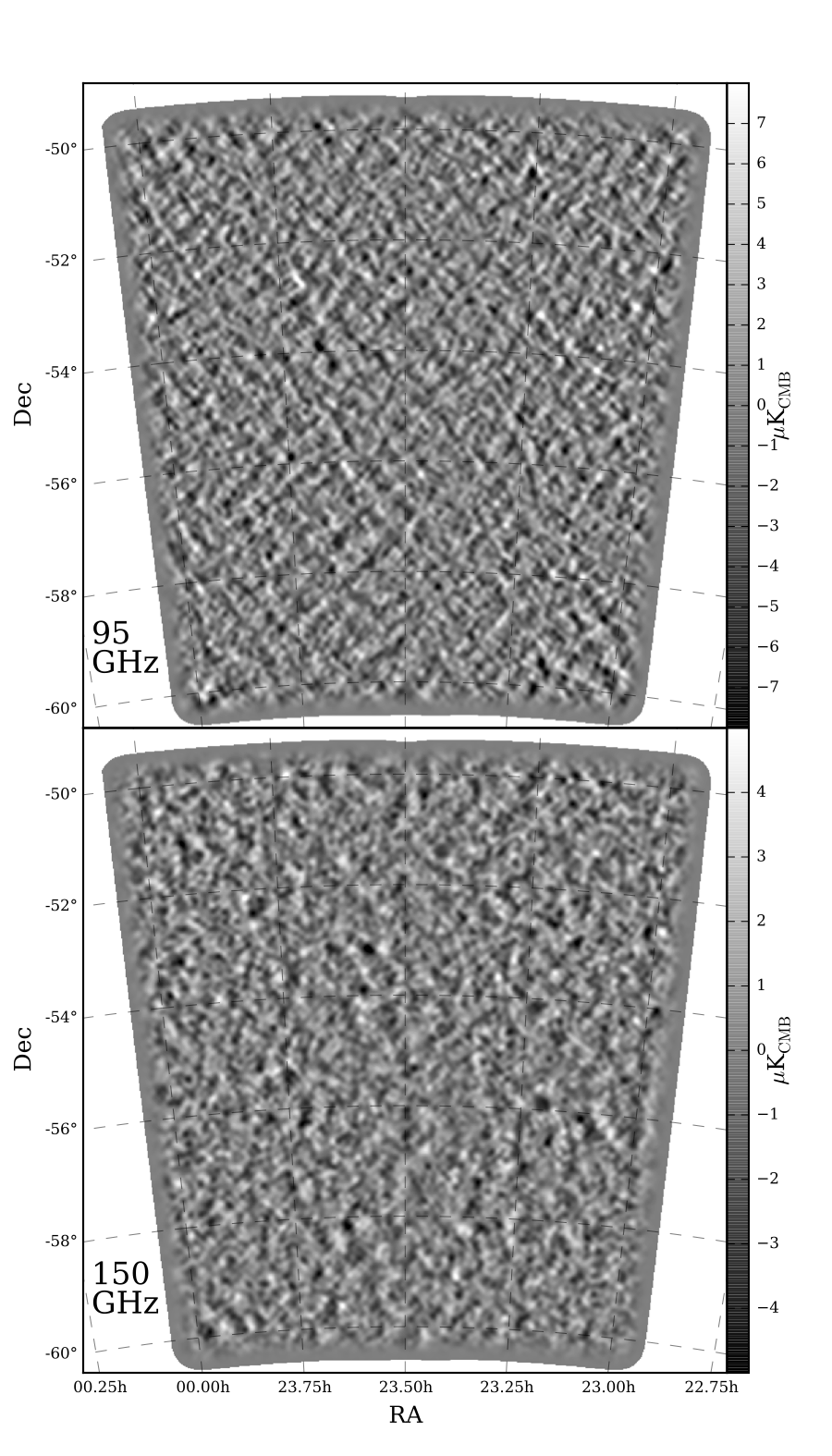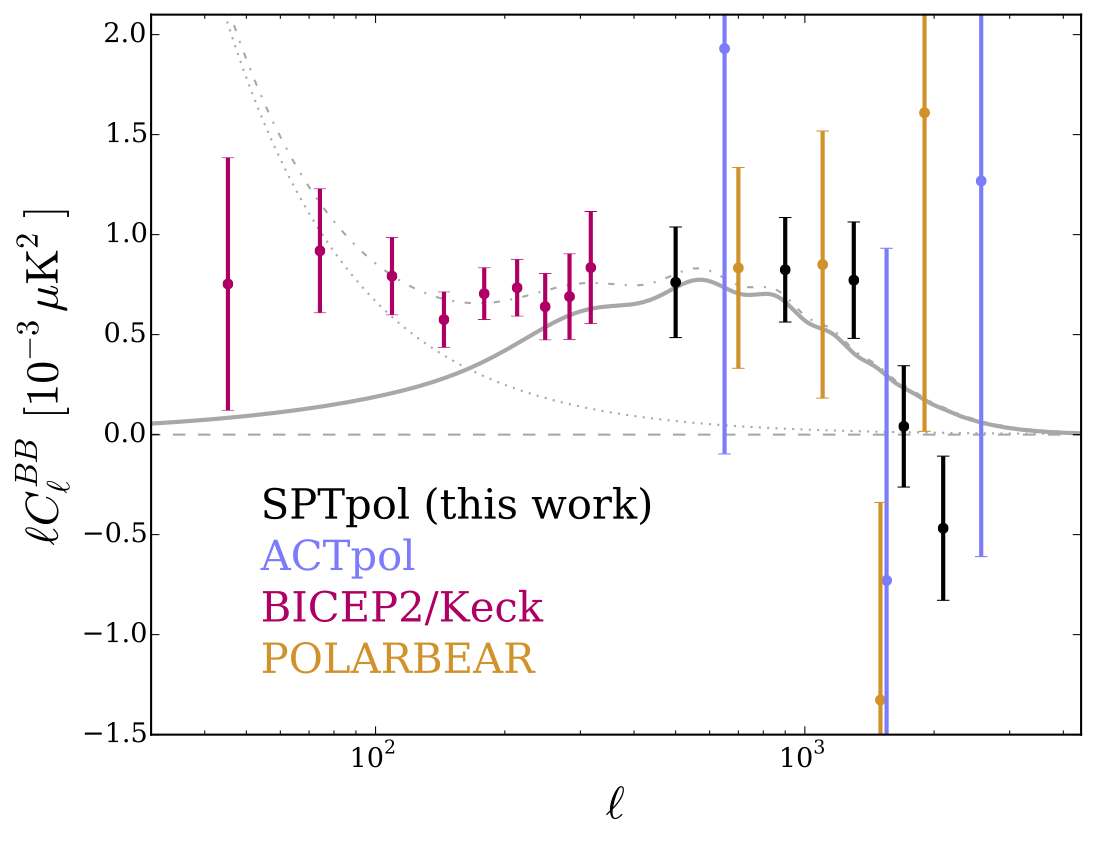|
Project Supported by
|
NSF, National Science Foundation
KICP, Kavli Institute for Cosmological Physics
USAP, United States Antarctic Program
Antarctic Support Contract (ASC)
DOE Office of High Energy Physics
|
|
|
Related Websites
|
CBI, Cosmic Background Imager
DASI, Degree Angular Scale Interferometer
WMAP, Wilkinson Microwave Anisotropy Probe
Planck
|
|
|
|
 | Overview |
|
 |
|
| |
This page provides data products associated with the SPTpol measurement of the CMB BB polarization power spectra described in astro-ph/1503.02315, Keisler et al., 2015. The power spectra are presented over the multipole range 300 <= ell <= 2300 and can be used to constrain cosmological models using the likelihood package provided below.
If you have any questions regarding this data set or its use, please contact Ryan Keisler (rkeisler_at_stanford_dot_edu) or Jason Henning (jhenning_at_kicp_dot_uchicago_dot_edu).
|
| |
 | Figures |
|
 |
|
| |
Individual figures are available in PDF format here or bundled in a ZIP file here. Below we show a couple of example figures.
|  The real-space representation of the B-modes analyzed in this work, at 95 GHz (top) and 150 GHz (bottom). The B-modes have been filtered by the two-dimensional Fourier weights \sqrt{H_\ell}, as defined in Section 5.3, and multiplied by the apodization mask. The crosshatch pattern faintly visible in the 95 GHz map is due to H_\ell being zero near lx = 0 and ly=0. These maps are noise-dominated on all angular scales.
(This is Figure 1 in Keisler et al., 2015.)
The real-space representation of the B-modes analyzed in this work, at 95 GHz (top) and 150 GHz (bottom). The B-modes have been filtered by the two-dimensional Fourier weights \sqrt{H_\ell}, as defined in Section 5.3, and multiplied by the apodization mask. The crosshatch pattern faintly visible in the 95 GHz map is due to H_\ell being zero near lx = 0 and ly=0. These maps are noise-dominated on all angular scales.
(This is Figure 1 in Keisler et al., 2015.)
|
 BB auto-spectrum measurements from SPTpol (this work), ACTpol (Naess et al. 2014), BICEP2/Keck (Keck Array and BICEP2 Collaborations et al. 2015), and POLARBEAR (POLARBEAR Collaboration 2014a). The highest multipole bin of the ACTpol data is not shown. The solid gray line shows the expected lensed BB spectrum from the Planck+lensing+WP+highL best-fit model in Table 5 of Planck Collaboration XVI (2014). The dotted line shows the nominal 150 GHz BB power spectrum of Galactic dust emission used in this work. This model is derived from an analysis of polarized dust emission in the BICEP2/Keck field using Planck data (Planck Collaboration et al. 2014). The dash-dotted line shows the sum of the lensed BB power and dust BB power.
(This is Figure 4 in Keisler et al., 2015.)
BB auto-spectrum measurements from SPTpol (this work), ACTpol (Naess et al. 2014), BICEP2/Keck (Keck Array and BICEP2 Collaborations et al. 2015), and POLARBEAR (POLARBEAR Collaboration 2014a). The highest multipole bin of the ACTpol data is not shown. The solid gray line shows the expected lensed BB spectrum from the Planck+lensing+WP+highL best-fit model in Table 5 of Planck Collaboration XVI (2014). The dotted line shows the nominal 150 GHz BB power spectrum of Galactic dust emission used in this work. This model is derived from an analysis of polarized dust emission in the BICEP2/Keck field using Planck data (Planck Collaboration et al. 2014). The dash-dotted line shows the sum of the lensed BB power and dust BB power.
(This is Figure 4 in Keisler et al., 2015.)
|
| |
 | Bandpowers |
|
 |
|
| |
We provide the SPTpol 95x95, 95x150, 150x150, and inverse-variance-weighted combined BB Bandpowers and uncertainties from 2012 and 2013 deep field observations. The bandpowers cover the multipole range 300 <= ell <= 2300 in bins of delta-ell = 400. Values given are \ell_center C_l and the units are [10^{-3} uK^2].
Bandcenters, bandpowers, and bandpower errors for plotting are provided in a text file here. Each row is one ell-bin and follows Table 1 of Keisler et al., 2015. The columns are (1) ell_center, (2) ell_min, (3) ell_max, (4) 95x95 bandpower, (5) 95x95 bandpower uncertainty, (6) 95x150 bandpower, (7) 95x150 bandpower uncertainty, (8) 150x150 bandpower, (9) 150x150 bandpower uncertainty, (10) inverse-variance-weighted combined bandpower, and (11) inverse-variance-weighted combined bandpower uncertainty.
If you have any questions regarding this data set or its use, please contact Ryan Keisler (rkeisler_at_stanford_dot_edu) or Jason Henning (jhenning_at_kicp_uchicago_edu).
|
| |
 | Likelihood Code |
|
 |
|
| |
We provide files in a gzipped tarball here that can be added to the Oct13 version of CosmoMC to interface with the SPTpol BB bandpowers discussed above. These files include the SPTpol likelihood, SPTpol data (bandpowers, covariance matrix, and bandpower window functions), batch file, an example runscript, and a README with instructions for how to modify a Makefile to compile CosmoMC with the SPTpol likelihood.
If you have any questions regarding this data set or its use, please contact Ryan Keisler (rkeisler_at_stanford_dot_edu) or Jason Henning (jhenning_at_kicp_uchicago_edu).
|
| |
|
|